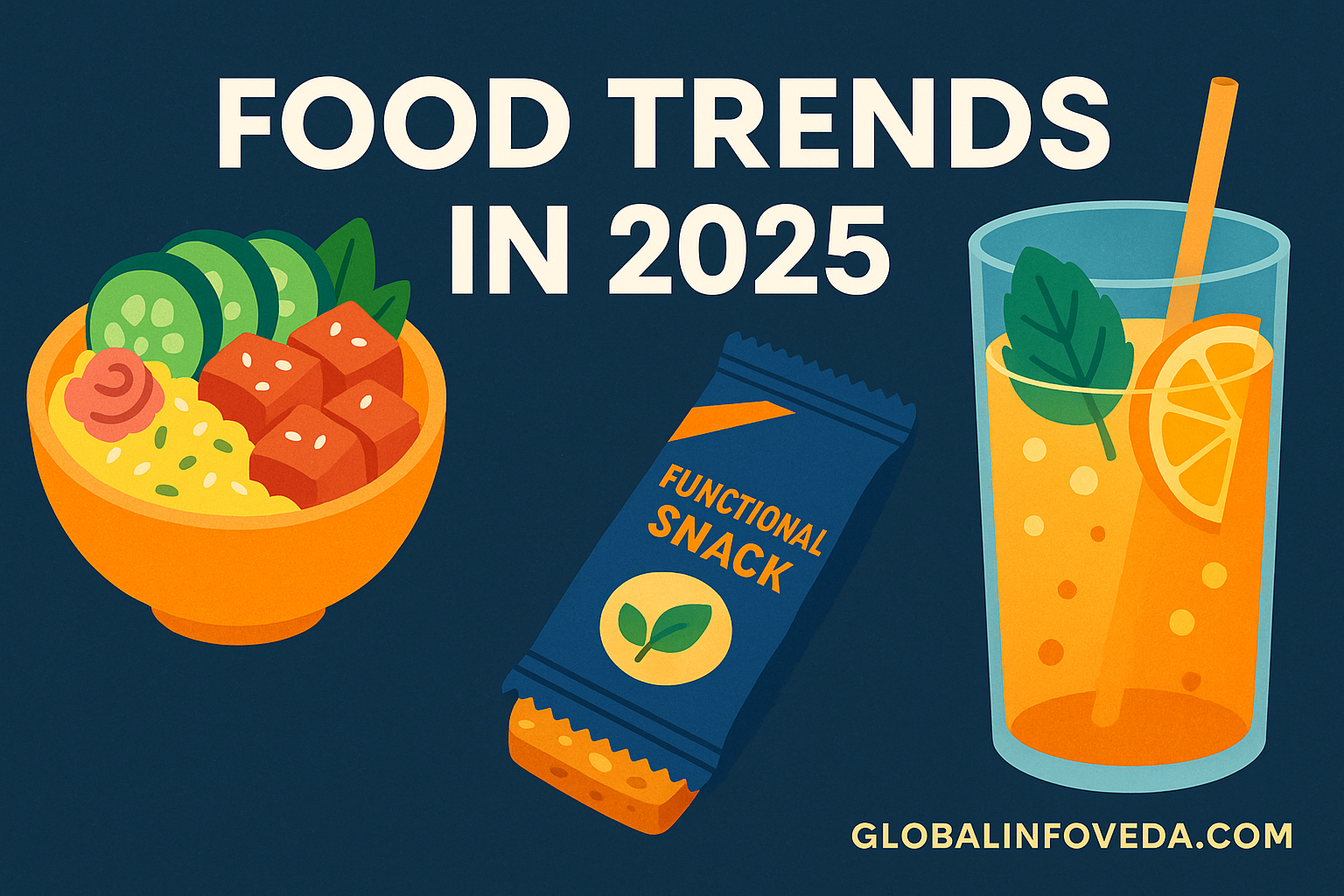Food Trips in 2025: Global Flavors, Functional Snacks & Sustainable Sips
🍽️ Introduction: Eating Our Way Through 2025
In 2025, the culinary world is not only about satisfying hunger—it’s about experiencing the intersection of flavor, wellness, and sustainability. Dining has transformed into a multisensory journey that reflects our globalized society, scientific advances in nutrition, and an urgent push toward environmental responsibility. From spice-laden night markets in Asia to chic European cafés serving climate-positive lattes, the food scene is more connected and purposeful than ever before.
Functional snacks enriched with superfoods and adaptogens, beverages produced from regenerative agriculture, and zero-waste dining practices are no longer niche—they’re mainstream. Today’s consumers demand transparency, traceability, and ethical responsibility from the brands they support. For more on these evolving patterns, see Food Trends in 2025: Functional Eating, Global Snacks, Low Sugar.
📊 Big Picture: What’s Driving the Food Trends of 2025
- 🌏 Global Culinary Crossovers: Chefs weave together culinary traditions from multiple continents, creating unique cultural hybrids.
- 🥦 Functional Nutrition: Food designed with health outcomes in mind—boosting immunity, brain function, and digestive health.
- 🌱 Eco-Friendly Eating: Prioritizing plant-based proteins, regenerative farming, and upcycling food waste.
- 💧 Sustainable Sips: Drinks from drought-resistant crops and innovative low-water brewing methods.
- 📦 Smart Packaging: Widespread adoption of edible films, compostable containers, and reusable delivery systems.
- 💹 Values-Driven Spending: Consumers support businesses that reflect their ethics.
🔍 Trends to Watch
1. Global Flavor Journeys
- Michelin-level dining inspired by humble street food traditions.
- African spice blends infused into Asian broths.
- Latin American grains combined with Mediterranean herbs.
2. Functional Snacks on the Rise
- Snack bars made with moringa, spirulina, and chia seeds.
- Adaptogen-infused chocolates designed for stress management.
- Vegetable-based prebiotic crisps promoting gut health.
3. Sustainable Beverage Revolution
- Coffee sourced from regenerative farms with blockchain-based traceability.
- Alcohol-free botanical elixirs for mindful drinking.
- Fermented drinks like kombucha blended with regional fruits and herbs.
For other lifestyle trends, check Biophilic Design at Home: 5 Simple Ways to Bring Nature Indoors.
📈 Economic Impact Analysis
- Premiumization of Street Food: Elevated presentation and pricing, turning local staples into gourmet experiences.
- Functional Food Boom: Market projected to grow at over 10% CAGR through 2030.
- Sustainability-Driven Investment: Capital flowing into plant-based and zero-waste food startups.
- Export Expansion: Demand for unique regional ingredients in international markets.
- Culinary Tourism Growth: Food becomes a central driver for travel planning.
📜 Historical Context
- 2010s: Plant-based alternatives gain mainstream traction.
- 2020s: Fusion cuisine and functional foods see mass adoption.
- 2025: Cultural heritage, health science, and sustainability converge to define the global palate.
📊 Comparison Chart: Traditional vs 2025 Food Trends
| Feature | Traditional Food Culture | 2025 Food Trends |
|---|---|---|
| Focus | Taste & Familiarity | Flavor + Function + Sustainability |
| Ingredients | Locally common | Globally sourced, ethically produced |
| Packaging | Plastic | Edible, biodegradable, reusable |
| Consumer Motivation | Habitual | Values-driven, experience-seeking |
| Beverages | Sugary sodas, alcohol | Functional, low-sugar, plant-based |
🏛️ Policy & Relief Measures
- Government Subsidies: Incentives for regenerative farming.
- Startup Grants: Support for plant-based and functional food entrepreneurs.
- Trade Prioritization: Agreements to favor ethically sourced imports.
- Labeling Reform: Clearer nutritional and sustainability indicators for consumers.
🌍 Cultural & Economic Implications
- Cross-Cultural Unity: Shared meals create bridges between communities.
- Health Transformation: Better access to nutrient-rich, minimally processed foods improves population health.
- Economic Empowerment: Small producers gain direct-to-market access through digital platforms.
- Environmental Gains: Lower emissions and resource use through plant-based adoption.
For more on eco-friendly lifestyle shifts, see How to Grow Organic Vegetables at Home (Step-by-Step).
🔮 Final Insight: The Future of Food is Global, Functional & Sustainable
By 2025, eating well means eating consciously. Those who adapt to this integrated vision of taste, health, and planet care will not only enjoy richer dining experiences but also contribute to a healthier, more equitable world.
📡 Read more at GlobalInfoVeda.com
